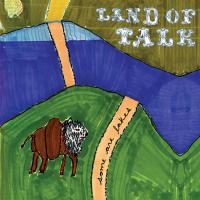Some Are Lakes is a good record. It's worth several listens. That said, it suffers from conceits not its own. Be it vocal conventions ill-advised on behalf of the band's singular talent, the inappropriate loudness of contemporary mastering or the inadequacy of a backseat drum aesthetic, a few things keep this record from being what it should be.
What records by Land of Talk can be is pretty limitless. There aren't too many emotions Liz Powell can't turn a good phrase about and the band has a wealth of structural and textural creativity at their disposal. Powell's a unique and refreshing voice, her local cache well-earned and she does an admirable job not only of hammering away at energetic, familiar progressions, but also of accessing guitar sounds that border on alienating, letting the listener rest on the cusp of aural interest. "Give Me Back My Heart Attack" demonstrates as much.
The songwriting is enviable. Adopting and subverting pop song structures can be like reinventing the wheel -- destined for novel failure, but Powell and company seem to do it with organic ease.
Powell's voice standing front and center most of the way through this record could have been a great thing, and at moments it is. She's a powerful singer with a good grasp of delivery and an abundance of nuance. Unfortunately it's in the space her voice inhabits that this record encounters most of its critical failures.
There's a fine line between rueful, restrained vocal performances and those that sound intentionally subdued and implicitly arrogant. On this record, most of Powell's singing falls within the less-charming territory on that spectrum. Sitting on top of everything else at pop song volume, these flattened articulations smother songs that could be far more interesting. "Got a Call" is a good example.
Powell isn't without her moments of triumph, though. When she brings herself to sing loud and vehement, the songs instantly reach higher ground. The record's standout track, "It's Okay" also provides the welcome relief of a quiet, intimate production landscape, in which the laze of Powell's voice takes on sincerest form. The same goes for acoustic closer "Troubled."
There's a good reason these songs are welcome respites: This record is plagued by a critical lack of dynamics. Just about everything is loud. The choruses are no larger than the verses, because there's nowhere to go but down in terms of volume. That's contemporary mastering. Years from now I'm sure this record will be considered another casualty of the volume wars. It could possess so much more staying power if it weren't for the way in which its loudness suffocates its wildly intelligent structure.
The drums suffer in this sonic space, too. They sound replaced and thuddy, unnecessarily consistent and simple. The songs shine when they dare to wander busily.
The most unfortunate component maligned herein is the lyricism. Powell's got a powerful mind and it shows itself readily at many junctures. Yet the sad, sparkling words are occasional and the rest is rhyme-y filler. It seems like this could have been great first draft material, but it isn't consistently insightful enough to hold continuous interest. Not to mention that Powell's too-tremulous delivery, combined with some droning double-tracking makes them oft-indecipherable.
